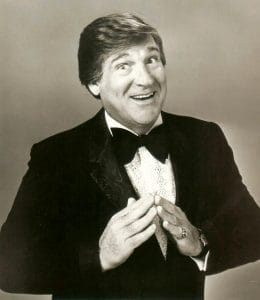Born in Chicago, Greene liked to sing, and formed a drama club at his high school. During World War II, he served in the U.S. Navy. After the war, “I enrolled at Wright Junior College in Chicago and planned to become a gym teacher,” and took a summer job at a resort near Milwaukee. “They paid me $20 a week and gave me a fancy title, ‘Social Director’,” he said in an interview years later. “We couldn’t afford to bring in acts so I’d get up and tell a few jokes, do pratfalls and whatever came to mind.” A few years later a friend recommended Shecky to a club owner in New Orleans who needed a comic. “The contract was for two weeks and I stayed three years. The band leader was a shy, fat kid named Al Hirt who played the greatest trumpet I’ve ever heard.” But the place burned down, so Greene headed back to the Junior College so he could be a gym teacher. That didn’t last long.

“I was in the dorm one night when Martha Raye called from Miami and asked me to play her club down there. I quit school again when they held me over for six weeks. This time, I made up my mind: I would stick with show business. I was only 25 years old and making $500 a week.” That’s the equivalent to around $6,500 today. After five years he was lured back to Chicago, and then to a town that was expanding its entertainment offerings: Las Vegas, where an agent booked him at the Frontier hotel. He killed: he was held over for 18 weeks, unprecedented at the time. During that time, he introduced a new young singer to the stage: Elvis Presley. “Before then, it was all country and western,” Greene said of the music acts in Vegas. “We had horses in the middle of the street. But when he came in, it had started to be a dressy crowd and everything.” The crowd liked Elvis so much the Frontier swapped him to be first in the lineup, kicking Greene to the second spot. But it was OK: Greene moved to the Tropicana, then the Riviera, which paid him $10,000 a week.
Greene had opened for Frank Sinatra when he worked at the original Fontainebleau in Miami Beach, but the two were well known to have a tense relationship. So it was a surprise when Greene, on one of his many appearances on The Tonight Show, told Johnny Carson that Sinatra had saved his life. Oh? Yeah: “Five guys were beating me up and Frank said, ‘OK, he’s had enough.’” But Greene was a favorite of many fellow comics — a “comedian’s comedian,” Bob Hope said, and “the epitome of comic genius” according to Jerry Lewis.

In the mid-1960s, Greene was performing at Harvey’s Casino Lake Tahoe when he spotted singer Nat King Cole in the audience, and pointed him out to the crowd. “Sitting with Nat Cole is a young comic I just saw, I liked him so much that, after I introduce him, every time I tell a joke, you’re going to look at him to see he’s laughing to make sure I am actually funny.” That was Pete Barbutti. Greene thought about it for a moment, then walked over to Barbutti and dragged him to the stage, sitting him on a stool, where he sat until the end of the show — laughing the entire time.
Greene retired from the stage in 2011, but would sometimes take the stage around town to do a quick act. In 2017, while dining at the Italian-American Club, a columnist for the Las Vegas Review-Journal says Greene stopped by his table to say “I’m going to do something.” John Katsilometes watched as Greene made his way to the stage — and then tripped, falling onto the stage and breaking his leg. As Greene waited for an ambulance to arrive, he called out to the audience, “I’ll do anything to get on stage!” Born Fred Sheldon Greenfield, Greene died at his Las Vegas home on December 31. He was 97.
